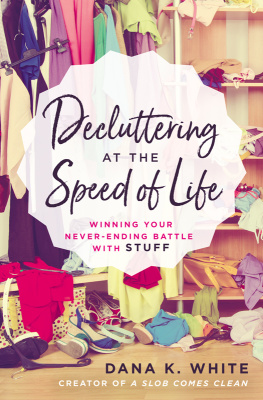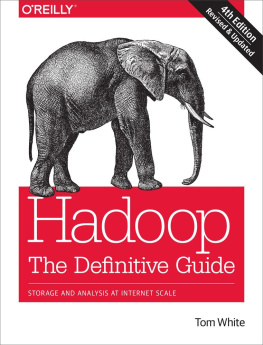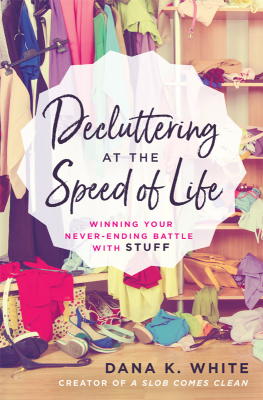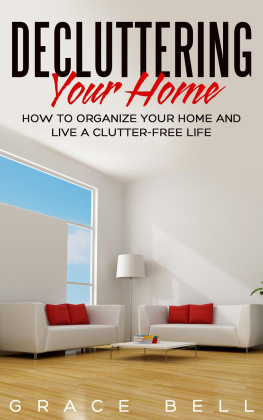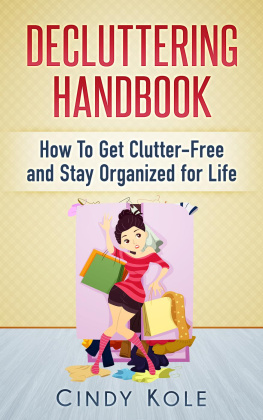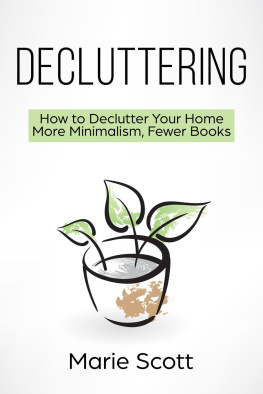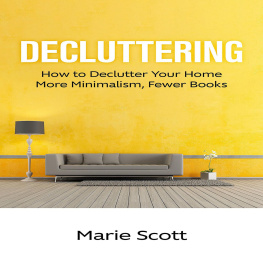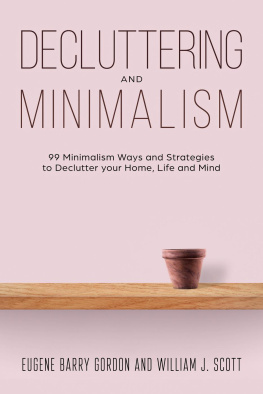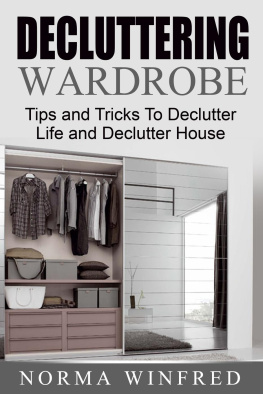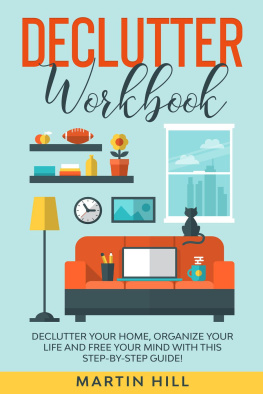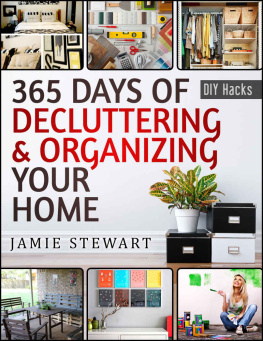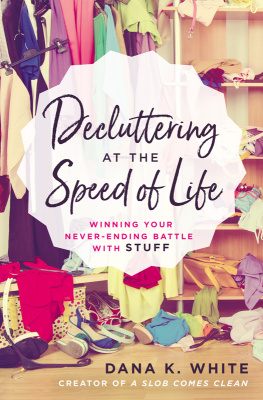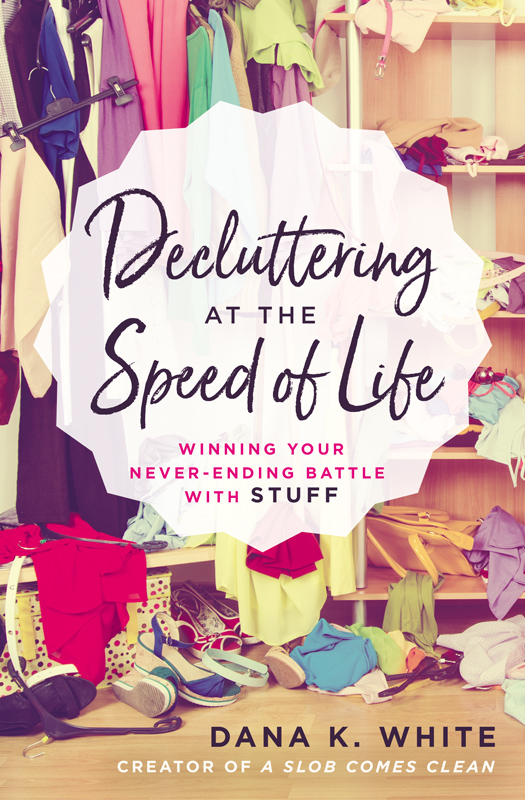Contents
Guide
D ecluttering is stuff you dont need leaving your house. And thats really all it is. If five things leave or five hundred things leave, youve succeeded.
Decluttering isnt Stuff Shifting. It isnt rearranging or buying a new shelving unit or sorting into slots or drawers or baskets.
Decluttering isnt organizing. When I realized decluttering and organizing were two different things and that it was okay to just declutter, I felt a weight lift off my soul. I no longer slumped my shoulders in defeat before I even started, knowing from experience that whatever solution I might create would surely fail like all the others had. Instead, I purged. I focused solely on getting things we didnt need out of our house.
When I did that, a weight lifted off my home as well. As things left, life was easier, and my home functioned better than it had after any of my attempts at organizing, just because there was less. Eventually, I understood that is what decluttering actually is: achieving less.
But before we jump in, I want to go over some key terms. Through my own decluttering escapades Ive come up with ways of explaining things to myself. Those of you who already know me and my made-up decluttering language will nod along. But if you are new to my style of decluttering, dont get overwhelmed. Were going to apply these concepts to each area of your home. If anything makes you say, Wha... ? I dont get that... I promise youll get it as you read the book. Well go step by step through your home and your hang-ups.
My favorite made-up word is deslobification. Its what I call the process through which I improved my own home from a constant state of oh-my-word-what-is-wrong-with-me to I-can-totally-do-this-even-though-its-never-going-to-be-perfect. Going from a worse-than-bad home to a livable one is how I learned these strategies and principles, and how I found a way to translate concepts that other people seemed to be born knowing into words that make sense to me and a lot of other people.
I definitely didnt make up the word clutter, but I did make up a definition for it that helped me get it out of my house. I define clutter as anything I cant keep under control. If a space in my home consistently gets out of control, I have too much stuff in that space. I have clutter.
Once I defined clutter this way, I finally understood why my friend and I can buy the same dcor, and her house looks like a magazine but mine looks like a thrift store. I have a Clutter Threshold, and its unique to me. My Clutter Threshold is the point at which stuff becomes clutter in my home. When Im living above my Clutter Threshold, theres more stuff in my home than I can handle, and my house is consistently out of control. Living under my Clutter Threshold helps my home stay more naturally under control. I found mine (and youll find yours) through decluttering.
But it wasnt easy. I suffered from Decluttering Paralysis, a real phenomenon that makes me unable to move when facing an overwhelming mess. I cured it by moving. By starting with the easy stuff. And strangely, every time I did something easy, the space looked better, and I was less overwhelmed.
Not that I dont make mistakes. I totally do. But Ive accepted that while Decluttering Regret (the realization that I need something after I declutter it) isnt fun, Ive survived every time. And the peace I feel over a home thats easier to manage outweighs the frustration I feel over having to write medium-sized cutting board on my shopping list. I accepted that people with homes that are consistently under control prefer living with regret over living with clutter. I want to be one of those people.
But even though Decluttering Paralysis and Decluttering Regret are terms that make me sigh, this one gives me hope: Decluttering Momentum. Its a real phenomenon. By starting with easy stuff and working through the steps Im sharing in this book, I saw visible, measurable improvement in my home. As my home changed, I changed. And decluttering got easier and easier. Im so excited for you to experience that too.
I had to develop decluttering strategies out of necessity. I couldnt go on living the way Id been living, with stuff (quite literally) spilling out of every cabinet door, covering every surface, and taking up every last available space in my home.
I had to dig my way out, and it was the most unnatural thing Id ever done. If Im left to my natural tendencies, clutter builds, and clutter stays.
I didnt know it was clutter. I thought it was all amazingly useful stuff. I just needed a moment to remember why Id considered it useful in the moment I brought it through my front (or side or back) door.
And that totally logical thinking was how I ended up in a place where I couldnt function in my own home. I couldnt even use my second largest room, and the rooms I could use were difficult to use because I had to work around all sorts of extra and unnecessary things, even though I didnt realize they were extra and unnecessary.
You want proof I know what its like to deal with clutter?
When my husband and I got married, he was thirty-two and I was twenty-five. Wed each lived alone and had whatever we needed to live alone.
Our marriage meant moving into one apartment that was, honestly, pretty large for a newly married couple just starting out. If I remember correctly, it was 960 square feet.
In that 960 square feet we had three dining tables. One formal dining table was in the dining area. Another formal dining table was awkwardly shoved in the teeny-tiny breakfast nook. And the small table (the one that actually made sense for a newlywed couple to have) was in the room we used for storage. The room that had boxes piled to the ceiling.
Eighteen years later I see the ridiculousness of our table situation, but at the time it didnt seem even a little bit strange. The apartment wasnt our real house. It was temporary. Who knew what kind of home or dining-area situation our future would bring? Why in the world wouldnt I keep all three tables until we knew what we needed in our real house? We were ready for the future and all the possibilities it could possibly bring.
Even the dining area (that fit one of the full-sized formal dining tables) was cramped. The walls were stacked waist high (at least) with more storage boxes full of totally-useful-in-the-future stuff. Or at least I assumed they were full of useful-in-the-future stuff. I didnt remember what was inside them.
Then we moved, and the house we moved into was a real house.
As we left that first apartment, my parents hired professional movers as a gift to us. I was about four months pregnant with our first child, and I appreciated their thoughtfulness so much. Those movers had no idea what they were getting into when they agreed to pack up and move our stuff. One of the men spent the entire day in my kitchen. My teeny-tiny kitchen in the apartment where exactly zero formal dinner parties had been held. All day. Just packing dishes.
We moved into our 1,752-square-foot real home from the 960-square-foot apartment and purged huge amounts of excess that wed never needed. And we still ended up with more stuff than space.
And then I became a stay-at-home mom. As we adjusted to living on a single income, I discovered garage sales and fell head over heels in love with them. Id been to garage sales before, but I became obsessed. I loved having a way to go shopping for pennies, since pennies were all we could afford to spend on nonnecessities.

